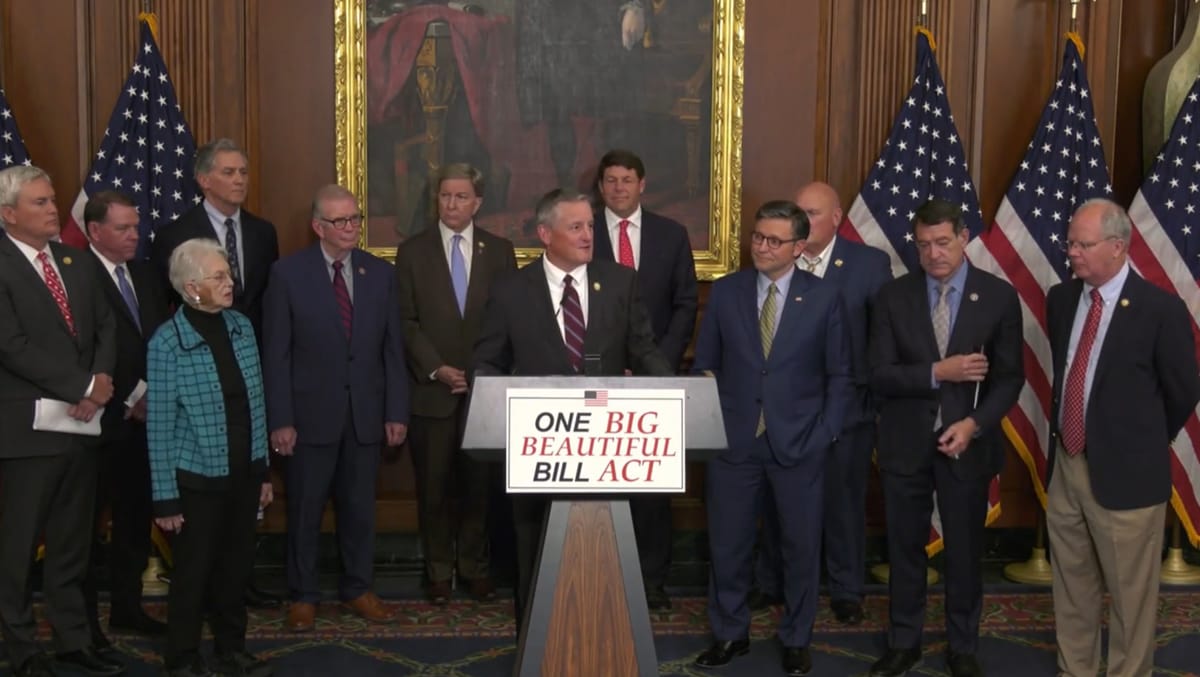Alabama Congressional Republicans Laud Passage of Big, Beautiful Bill
Bill passed 215-214 early Thursday morning

The U.S. House of Representatives passed the "One Big Beautiful Bill Act" early Thursday morning by a razor-thin margin of 215–214, with one member voting present. The legislation, a cornerstone of former President Donald Trump's second-term agenda, now advances to the Senate, where it faces further scrutiny and potential amendments.
The bill encompasses a broad range of policy changes, including:
- Tax Reforms: Permanent extension of the 2017 Trump-era tax cuts, increased child tax credits, and new deductions for tips and overtime pay.
- Healthcare Changes: Implementation of Medicaid work requirements starting in 2026 and a ban on Medicaid coverage for gender-affirming care for individuals of all ages.
- Defense and Border Security: Allocation of $150 billion for defense spending and $70 billion for border security measures, including the construction of barriers and hiring additional personnel.
- Education Adjustments: Introduction of "Workforce Pell Grants" for trade school students and elimination of federal direct subsidized loans for undergraduates.
Representative Dale W. Strong (R-AL5) issued the following statement after voting in favor of the Bill, lauding its effects on his constituents and the nation as a whole:
"This is not just legislation, it's a promise kept to the American people. It's pro-worker, pro-family, pro-growth—and it's exactly what our country needs right now," said Rep. Dale Strong. "I'm proud to support President Trump's promise to deliver historic tax relief and put money back in the pockets of American families, secure our southern border, strengthen our national security, and right-size wasteful government spending."
Specifically, the bill:
- Saves families in Alabama's Fifth Congressional District $1,656 on average
- Makes 2017 Trump Tax Cuts permanent - protecting taxpayers from a 22% tax hike
- Secures and expands the doubled Child Tax Credit, benefiting nearly 90,000 hardworking North Alabama families
- Provides resources to complete and construct over 2,300 miles of border wall
- Secures historic investments in our national security with $25 billion for President Trump's Golden Dome and $21 billion to restock America's arsenal
- Restores integrity to taxpayer-funded programs by ensuring federal funds only go to the most vulnerable and needy - as originally intended - not to those who are ineligible or illegally present in our country
- Makes Rural America & Main Street Grow Again by expanding the 199A deduction to 23% - creating 1 million new jobs annually and generating $750 billion in economic growth
- Renews 100% immediate Research and Development expensing, fueling the cutting-edge innovation driven by North Alabama
Rep. Barry Moore (R-AL1) took to social media after the marathon House session to say:
‘It was a long night on the House floor but Republicans just delivered on the American people’s mandate by passing President Trump’s Big Beautiful Bill!
‘This bill ensures his historic tax cuts stay in place, we fund border security for years to come, and cut waste, fraud and abuse in our government.”
Rep, Robert Aderholt (R-AL4) also posted that:
I voted YES on the One Big Beautiful Bill because families deserve:
- Tax relief
- Border security
- A government that lives within its means
- Protections for the most vulnerable—including an adoption tax credit I helped secure.
Rep. Mike Rogers (R-AL5) posted this picture about the bill’s passage:

The House Republican Press Conference following the passage of the bill can be seen HERE.
Speaker of the House Mike Johnson described the bill as "generational, nation-shaping legislation," emphasizing its significance in advancing the party's policy goals.
Democrats unanimously opposed the bill, citing concerns over its impact on lower-income Americans and the potential loss of healthcare coverage for millions. Critics also highlighted the projected increase in the national deficit, with estimates suggesting the bill could add approximately $3.4 trillion to the deficit by 2034.
The legislation now moves to the Senate, where Republican leaders have indicated that modifications are likely. Senate Majority Leader John Thune acknowledged the need for adjustments, stating, "There are things that we need to adjust or modify or change."




